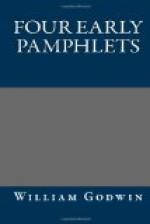Let it be observed that I have not fixed upon the age of ten years at random. It is the observation of Rousseau; Both children and men are essentially feeble. Children, because however few be their wants, they are unable to supply them. Men, in a state of society, because whatever be their absolute strength, the play of the imagination renders their desires yet greater. There is an intermediate period, in which our powers having made some progress, and the artificial and imaginary wants being unknown, we are relatively strong. And this he represents as the principal period of instruction. This remark is indeed still more striking, when applied to a pupil, the progress of whose imagination is sedulously retarded. But it is not destitute either of truth or utility in the most general application we can possibly give it. Let it be observed, that Rousseau fixes the commencement of this period at twelve years. I would choose to take it at ten.
However we may find it convenient to distribute the productions of nature into classes, and her operations into epochas, yet let it be remembered, that her progress is silent and imperceptible. Between a perfect animal and vegetable, the distinction is of the highest order. Between distant periods we may remark the most important differences. But the gradations of nature are uninterrupted. Of her chain every link is compleat. As therefore I shall find in commencing at ten years, that my time will be barely sufficient for the purposes to which I would appropriate it, I consider this circumstance as sufficient to determine my election. A youth of ten years is omnipotent, if we contrast him with a youth of eight.
But if the languages constitute so valuable a part of a just system of education, the next question is, in what manner they are to be taught. Indeed, I believe, if the persons employed in the business of education had taken half the pains to smooth the access to this department of literature, that they have employed to plant it round with briars and thorns, its utility and propriety, in the view we are now considering it, would scarcely have been questioned.
There is something necessarily disgusting in the forms of grammar. Grammar therefore is made in our public schools the business of a twelvemonth. Rules are heaped upon rules with laborious stupidity. To render them the more formidable, they are presented to our youth in the very language, the first principles of which they are designed to teach. For my own part, I am persuaded the whole business of grammar may be dispatched in a fortnight. I would only teach the declensions of nouns, and the inflexions of verbs. For the rest, nothing is so easily demonstrated, as that the auxiliary sciences are best communicated in connection with their principals. Chronology, geography, are never so thoroughly understood, as by him that treats them literally as the handmaids of history. He, who is instructed in Latin with clearness and accuracy, will never be at a loss for the rules of grammar.




